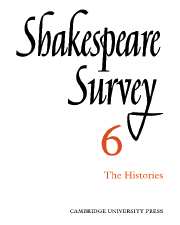Book contents
- Frontmatter
- Shakespeare's History plays: 1900-1951
- The Unity of 2 Henry IV
- Anticipation and Foreboding in Shakespeare’s Early Histories
- Middle-Class Attitudes in Shakespeare’s Histories
- A Reconsideration of Edward III
- On Producing Henry VI
- The Huntington Library
- An Early Elizabethan Playhouse
- Shakespeare Learns the Value of Money: The Dramatist at Work on Timon of Athens
- Shakespeare’s French Fruits
- An Elizabethan Eyewitness of Antony and Cleopatra?
- Othello’s “It is the cause . . .”: An Analysis
- On Translating Hamlet
- Shakespeare in China
- International Notes
- Shakespeare Productions in the United Kingdom: 1951
- Shakespeare’s History Plays - Epic or Drama?
- Festival Shakespeare in the West End
- The Year's Contributions to Shakespearian Study 1 Critical Studies
- 2 Shakespeare’s Life, Times and Stage
- 3 Textual Studies
- Books Received
- Index
- Plate Section
Festival Shakespeare in the West End
Published online by Cambridge University Press: 28 March 2007
- Frontmatter
- Shakespeare's History plays: 1900-1951
- The Unity of 2 Henry IV
- Anticipation and Foreboding in Shakespeare’s Early Histories
- Middle-Class Attitudes in Shakespeare’s Histories
- A Reconsideration of Edward III
- On Producing Henry VI
- The Huntington Library
- An Early Elizabethan Playhouse
- Shakespeare Learns the Value of Money: The Dramatist at Work on Timon of Athens
- Shakespeare’s French Fruits
- An Elizabethan Eyewitness of Antony and Cleopatra?
- Othello’s “It is the cause . . .”: An Analysis
- On Translating Hamlet
- Shakespeare in China
- International Notes
- Shakespeare Productions in the United Kingdom: 1951
- Shakespeare’s History Plays - Epic or Drama?
- Festival Shakespeare in the West End
- The Year's Contributions to Shakespearian Study 1 Critical Studies
- 2 Shakespeare’s Life, Times and Stage
- 3 Textual Studies
- Books Received
- Index
- Plate Section
Summary
“Antony and Cleopatra is an attempt at serious drama. To say that there is plenty of bogus characterization in it—Enobarbus for instance—is merely to say that it is by Shakespeare. But the contrast between Caesar and Antony is true human drama; and Caesar himself is deeper than the usual Shakespearean stage king.” Thus Bernard Shaw in 1897, after “an afternoon of lacerating anguish, spent partly in contemplating Miss Achurch’s overpowering experiments in rhetoric, and partly in wishing I had never been born”. He had already endured the production at Manchester, where Janet Achurch’s magnificent voice and audacious but discordant conception of Shakespeare’s music suggested that she had been “excited by the Hallelujah Chorus to dance on the keyboard of a great organ with all the stops pulled out”. Janet Achurch had created Ibsen’s heroines for the English intelligentsia—unapproachable as Nora and Mrs Alving—and for Cleopatra, having no gift for comedy, “she substituted Brynhild-cum-Nora Helmer in an Ibsen-and-Wagner pie”.”
- Type
- Chapter
- Information
- Shakespeare Survey , pp. 140 - 146Publisher: Cambridge University PressPrint publication year: 1953

